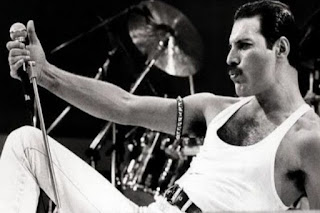MM- Today we'll be talking about Freddie Mercury. I'd say he's probably one of the most influential voices of the 20th century. He was born in 1946 and then died in 1991, unfortunately, due to AIDS. But he he was one of the most incredible singers of his time and changed so much with his band, Queen, just with the music industry as a whole, creating individualism, I think, and changing the way the standard and not fitting in a box. They did their own thing and people loved it. And they're still very influential today.
MM- I think they're still very relevant, especially to my generation. So I interviewed two people about their thoughts. One person was alive during the time that Freddie was and then the other is my younger brother, so kind of trying to get perspectives on the two divides in generation. So today I'm going to ask you some questions about Freddie Mercury.
ACL- Wonderful.
MM- So you lived when he was an artist. Well, when he was still alive. And do you remember the first time you heard about him or, like, listened to his music?
ACL- I don't remember the first time off the top of my head, but I'm imagining was probably on MTV. I grew up and MTV was a big social phenomenon, cultural phenomenon. So definitely, I would imagine I heard his songs or Queen songs on MTV. I probably saw some of their music videos.
MM- Because they were very different from a lot of artists that had been singing before. Do you remember feeling some sort of impact or, like, how did it impact you? How different they were from other people?
ACL- Yeah, that's a tough one, because full disclosure, I wasn't alive for a lot of their career. I was born in 85, so I was still very young, maybe in some of their biggest days. But I think even with some of their music videos, there's, like cross dressing and things and some of their songs maybe give you hints that they're kind of going beyond. So obviously, they're extremely talented. But even their performance at that big festival, I can't remember the name, but you probably know what I'm talking about.
ACL- The famous one that was in that movie as well. I could tell that they were kind of a little bit different. And Freddie Mercury, as a front man, is a little bit different. There's definitely a big sort of cultural phenomenon of like Freddie Mercury and what he represented and what he went up against and everything he did, like in the face of all this scrutiny and things. So I think over the years has become more apparent, at least for me of my early age, I was just like, this is great music, that's all that matters.
ACL- But I think as I got older, as I was performing music and cover bands and playing it with friends at different shows and venues and things, it became pretty clear that no, this is bigger than just the music. This is about what it represents, what they're fighting for, kind of that sense of their role models for a lot of people. And I think a lot of people look to Freddie and the rest of the band for, like, inspiration, especially when they're going through rough times, which I think is pretty awesome.
MM- Yeah.
MM- Thank you so much.
ACL- You're very welcome.
MM- Hello.
OM- Hello.
MM- So I'm here to interview you about Freddie Mercury, because I know you are a big fan of Queen, and you went through a little what's that song? Another one bites the dust phase where you would play that all the time. Yeah. My first question is, since you were not alive during the time of Queen and Freddie Mercury's influence, how do you feel like it is influencing you now being part of almost two generations later?
OM- I feel like I'm a part of the culture, if that makes sense, because a lot of the songs I listen to are of that generation, and it's interesting to hear the music and to see how it still is relative. Like, some of the songs are like, about inequality and stuff and how that's still around and others are about peace and things like that and people can still relate to it.
MM- Yeah.
OM- It's like something people can still relate to, and it's interesting to look back and you're like, oh, this song must have been made recently because the events are somewhat the same. And you see, they're made in, like, the 60s or 70s or whatever. I don't know. I just think that's interesting. And then Freddie, I just love his music. He's a really good singer, and my friend showed me the music, and I don't know, I liked it. Yeah.
MM- I definitely think Freddie's voice is a unique voice that I feel like hasn't been replicated since his time. And he did things that a lot of other singers couldn't do and opened up. I think the music industry to being what it is today with a lot of, like, I don't know, just more free spirit and individualism. And, like, not fitting a box.
OM- I do believe they actually created their own genre of music, too, which is very interesting.
MM- Yeah.
MM- Well, thank you for coming here today.
OM- Short and sweet, right.
MM- Ow.

No comments:
Post a Comment